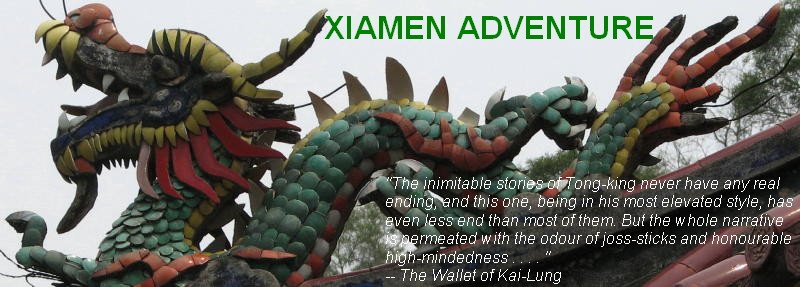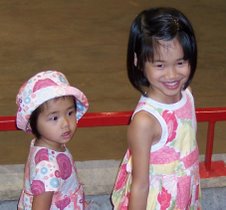On another topic, I noticed in a previous post when you visited the temple
you discussed the people begging. My daughter, from Guangxi, has limb
difference. From her history we know she was very embarrassed in China and
was told to feel ashamed (from strangers, not her foster family). We also
saw so many people with different physical differences resorting to lives on
the streets. Now that you are living there, could you provide insight on
what type of lives most people have with physical differences, is it really
the only way to survive--begging? If possible, could you find out the
opinions of the younger people on how they view people, who although totally
brilliant of mind, but have physical differences are treated in society and
the futures they would have? We have always wanted to live in China temp. as
Madeline was growing up, but with what I have heard here and in other blogs
it might not be a good idea.
It's funny you should mention that -- we actually talked about this in my Women & Law class the other day (How is it relevant? We were discussing the difference between formal equality, as evidenced by Title VII of the Civil Rights Act of 1964, and substantive equality, as evidenced by the Americans with Disabilities Act.).
Students told me that it was only "ignorant" (their word) "country people" who continued to stigmatize people with physical differences. They agreed that there was a traditional view that people with disabilities were somehow to blame for their disabilities, and that many people wished to avoid them for fear that the bad luck that cursed them would rub off on them. That means they cannot find jobs, often have difficulty finding places to live, and cannot even get service in restaurants. But they said in urban areas, that attitude was no longer prevalent. But when I asked them if they knew people -- students, working people, family members -- with physical disabilities, none could think of any.
But I think they are right that there is a gradual change in people's attitude going on. We've seen several public service ads on Chinese TV that seem to be about equal rights for those with physical disabilities (hard to say exactly what they were about since they were in Chinese!). I've seen several students on campus who appear to have some physical limitations but who are students nonetheless, which I think is encouraging.
It was also interesting at Nanputuo to see one little boy with hearing aids playing with his parents -- a good reminder to those of us in the China adoption community who see so many special needs children available for adoption that some Chinese do choose to parent their children with disabilities.
What I've told the kids about why the people are begging is exactly what you describe as the Chinese attitude toward disabilities. Zoe wants us to give them money, but I tell her no. As much as I'd like to help, I'm concerned that we are simply too memorable (being one of the few caucasians and practically the only with Chinese kids) and would be easily targeted by all the beggers. Though we could afford to give a few kwai to all, their persistence has really been a problem for Maya.
The other day, though, I heard the girls playing in their room: Zoe said to Maya, "Pretend you are a begger and this is your bowl . . . ." Hmm, I'm not sure whether that's a good thing or not.







8 comments:
Malinda,
Now that I've posted once, I can hardly stand not to post more often; a tribute to how much I am enjoying your blog as it reminds me so much of my 3 weeks in China in 2003.
Just a word on the attitudes concerning disabilities. I so hope it is changing in that country. (We too saw a great deal of begging by very deformed people.) Personally we understand this discrimination as in 2005 we sent a young girl to college who lives in our Dawn's SWI. She is there probably for two reasons: one, she's a girl, and two she has (can't remember the term)no pigmentation on large areas of her face, arms and hands. She wants desparately to be a teacher and when she interviewed was told, "she's a lovely girl, but would scare the children". She, with the help of her WONDERFUL orphanage director, persued and was finally admitted; however will probably end up teaching in the orphanage kindergarten when she graduates. Li Ying was told essentially the same thing when she wanted a job as a waitress; she will scare the customers!
Also, I find it very interesting that so many of the children use the "peace sign" when you take their picture. When we visited our granddaughter's school in 2003, all the children (and teachers)signed it as well. Makes one wonder what the Chinese consider "peace".
Is there any avenue to help without opening yourselves to too much unwanted attention? For example, in the US we would give to agencies that distribute aid. We hate to make it look like we are ignoring other's plight, but the need to help in the right ways is important to model for the children too.
H. Whitaker
You keep misspelling "beggar".
Thank you for posting this.
When we met with Madeline's foster mother (and extended family) we were told some of the "horror" stories she had already encountered at the ripe old age of 25 months. She hid her hands in public at ALL times and went absolutely out of her mind when they wanted to remove her sock for the footprint. It was so overwhelmingly sad.
One of the hardest things we had to overcome was that she was told once she got to America her fingers and toes would grow back. Explain that to a two year old.
We know from her experiences that the taunting was daily in public--in a large city.
I am so glad to hear that attitudes are changing among the youth, but then again I wonder what type of exposure they have had--like you mentioned.
I guess I can only hope things will change--here and there. We don't deal with it here on a daily basis and it is not so invasive, yet prejudice exists.
Maybe we can reconsider our plans when she is older.
It amazed me at how people just walked by children and adults alike that were in need, we were told to just keep walking (and I think maybe you may have to since you will be living there awhile and could encounter people who follow you home). I did bring shiny necklaces for the street children and passed them out. I know they in NO way helped them with a meal, but it did add many smiles to their faces and made them happy if just for a moment. One little girl (about 7) will be etched into my mind forever--that necklace was a treasure to her that was so valued. We did give a little here and there as we passed or when we were leaving an area. I just could not do nothing.
The anonymous person who knows how to spell "beggar", may be a good speller, but that person does not even has the courage to sign her/his name. So the comment is meaningless. Malinda, just consider the source!
Hello, I travel to China quite often as a part of my job. One type of jobs that is available to the visually impaired is medical massage. The Chinese believes that the visually impaired have specially sensitive hands and can do a better job of working out mussle tension. My favorite place in Beijing is a medical massage school for the visually impaired. They teach young blind students on live customers.
Trieu
LOL! Thanks, Mom, but a little criticism never hurt anyone! If I took it to heart, I wouldn't be posting all about myself and my feelings and my thoughts for all the world to see! And the person is right -- I DID misspell BEGGAR! I try to be careful about such things in my academic writing, but give myself leeway to be sloppy in this blog.
Oh, the criticism did not bother me. You know I am a stickler when it comes to spelling. Since I know you and know that you are a good speller, I thought it was a typo. What bothered me was that the criticism was anonymous. It showed cowardice and did not impress me at all! I still stand in my thinking that if you are going to criticize, then have the "guts" to identify yourself... Otherwise the comment is worthless.
Post a Comment